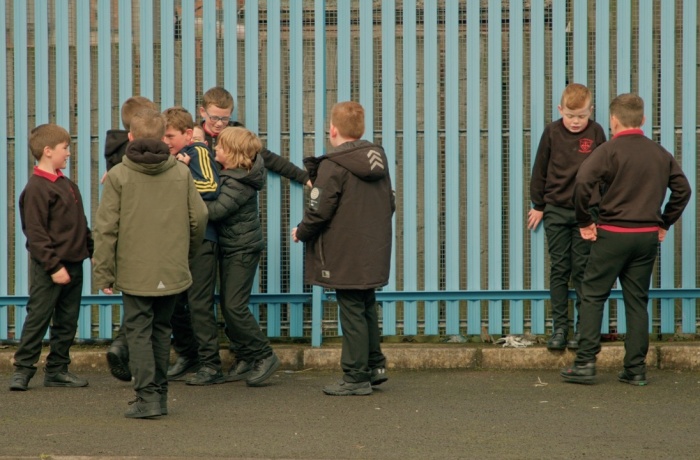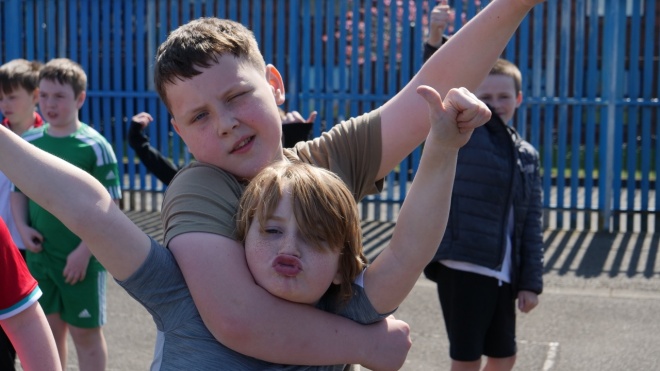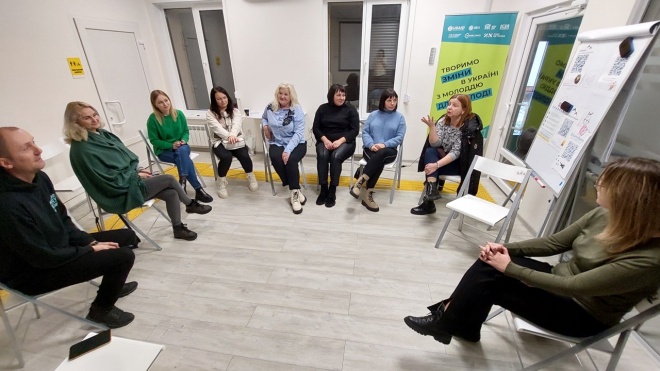Young Plato: How does the war affect Ukrainian youth? Film screening and discussion in Prykarpattia
Young Plato: How does the war affect Ukrainian youth? Film screening and discussion in Prykarpattia

The full-scale war in Ukraine impacts not only adults but also changes the lives of young people who, though indirectly, are entwined in the clash between the two nations.
What exactly are children experiencing, and is there communication about the events they are witnessing and living through? This was discussed in Prykarpattia through the documentary Young Plato by Neasa Ní Chianáin and Declan McGrath.
The film was screened at different venues, including sessions for schoolchildren and educators, organized by Tetiana Pihurska, the regional festival coordinator of the Moloda Prosvita regional organization.
It narrates the story of a boys’ school in the working-class Ardoyne neighbourhood of Belfast, Northern Ireland. The area is plagued by poverty and drug trafficking, and some residents are accustomed to a culture of violence. The school’s principal and staff work together to cultivate critical thinking in their students, urging them to avoid the path of violence.
The film was first screened at Sadzhava Lyceum, where high school students had the chance to watch it. The screening was followed by a discussion, where students briefly shared whether they and their teachers engaged in conversations about the war. Mostly, teenagers learn about all the events at the front through the news, and it’s not common to discuss these matters with adults in their families or at school. The visuals evoke different emotions in them – feelings of anxiety and fear, intertwined with moments of joy. However, they navigate these emotions on their own.

A still from Young Plato
After the screening at the Khyzhka youth centre, a more lively discussion ensued with the educators of the Dolyna community who watched Young Plato.
Nadiia, a social pedagogue, shared that schoolchildren are now quite “charged,” leading to an increase in bullying cases: “We have a boy here whose father is at war. His mother is around, but you can see that he lacks attention. Because of this, he’s hurt and insulted many students. At first, other kids tolerated him, but now they’ve teamed up, and he’s getting some backlash.”
Volodymyr Nai, the head of the Youth Council of the Dolyna City Council, highlighted the film’s approach to addressing bullying: “The staff uses the Socratic method when communicating with children. Instead of providing a direct solution to a particular situation, adults, by asking questions, help the children find their own right answer. This is a valuable example that should be considered.”
The educators also agreed that some teachers in their community struggle to adapt to the principles of the New Ukrainian School, aimed at fostering social equality and cohesion in educational institutions.
“Children in primary school enjoy more freedom. They can freely get up, leave the classroom, and communicate with adults informally. However, when they enter the fifth grade, they meet old-school teachers who do not understand the reform. These teachers expect children to walk in line and follow commands. This often results in conflicts and complete rejection of the teacher by the children,” explained Ms. Nadiia.

Travelling Docudays UA in Dolyna, Prykarpattia region
In conclusion, the educators suggested to the Docudays UA team that adding Young Plato to the list of available films for the DOCU/CLUB network could be beneficial. They feel that the film might serve as a practical tool to help teachers interact more effectively and empathetically with children.
Main photo: A still from Young Plato.
The 20th Travelling Docudays UA is supported by the Embassy of Sweden in Ukraine, the Embassy of Switzerland in Ukraine, and the US Embassy in Ukraine. Opinions, conclusions, or recommendations do not necessarily reflect the views of the governments, charities, or companies of these countries. The content of this publication is the sole responsibility of its authors.












